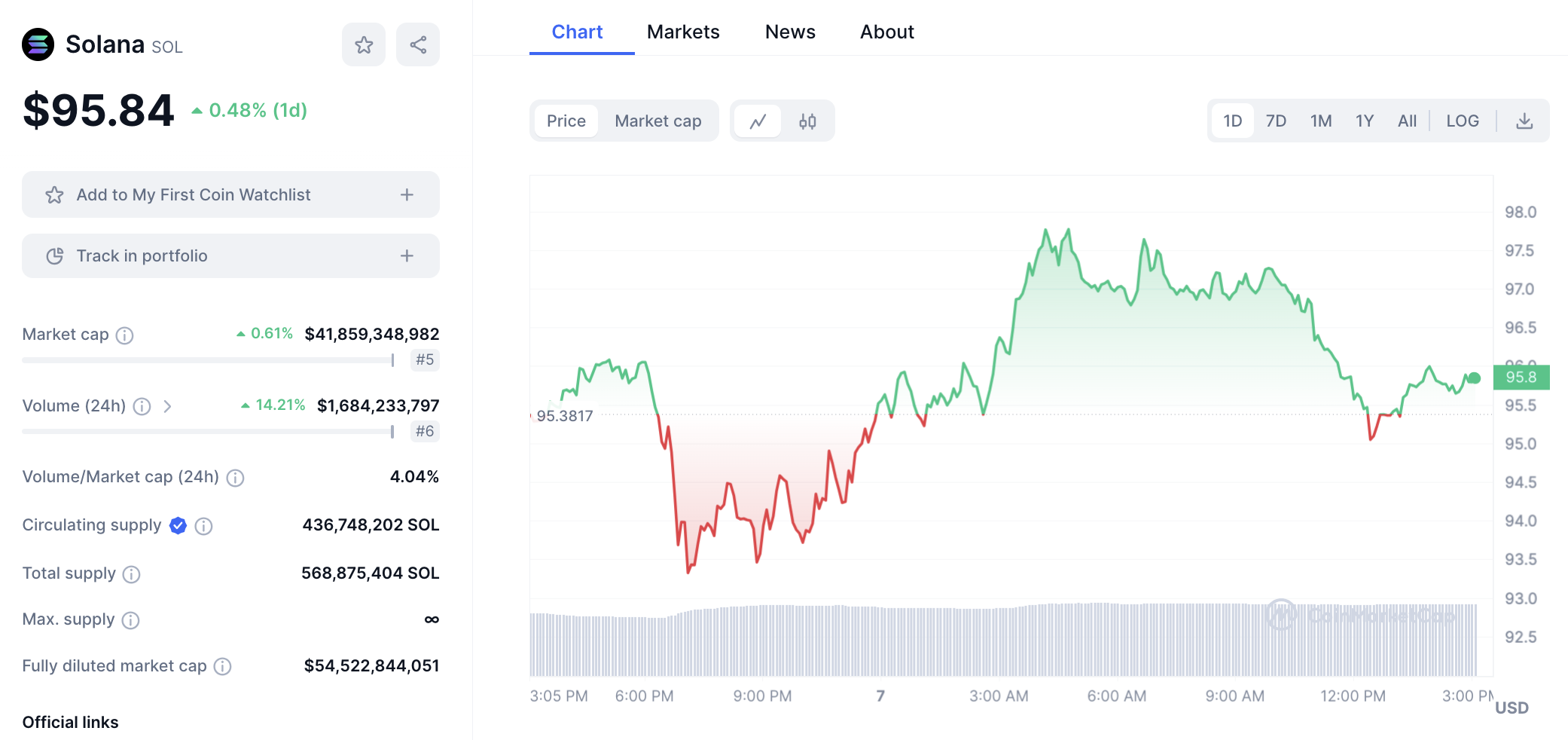Amid Another Solana Outage, Should You Worry About Blockchain Crashes?

Solana experienced a five-hour outage on Tuesday, marking its first outage in almost one year.
At 5:30 am ET, the Solana mainnet halted and paused all activity on the blockchain, requiring a network restart. Engineers drummed up a validator software patch an hour later, allowing validators to upgrade to version 1.17.20 and restart the chain.
"Solana Mainnet-Beta is experiencing a performance degradation, block progression is currently halted, core engineers & validators are actively investigating," Laine, a Solana validator, said in an X post at the time.
The network restart was completed shortly before 10:00 am ET, once validators with more than 80% of the SOL staked and updated.
Note: Once the cluster restarts (80% of stake online) validators will process blocks, however for most dapps to work we also need RPC providers to restart and come back online, this means after the cluster restart some services may still be affected.
— Laine ❤️ stakewiz.com (@laine_sa_) February 6, 2024
Call to RPCs and dapps:…
SOL's price dropped around 3% to $93.39 amid the outage but has since returned to $95.84 at the time of writing.

Solana PTSD
For many Solana participants, the outage resulted in PTSD from the days when the blockchain was notorious for its frequent disruptions. Tuesday marked Solana's eleventh outage since its launch in March 2020.
Its last outage occurred on 25 February 2023, which knocked the network out for 19 hours.
Solana had previously experienced network downtime events every few months. In January 2022, the network suffered six major and three partial outages.
“Solana definitely has fewer validators than other chains, but I would argue against how this makes it easier to deal with outages”, Solana FM’s Syamiir Othman told Blockhead in 2022.
“Take the outage in September 2021 for example. SOL had about 800 validators but consensus took about 17 hours," he said. Solana now has 3,400 validators.
Unshaken Solana Supporters
Over the past year, Solana hype has been real. Up more than 310%, Solana has even outperformed Bitcoin. The likes of exciting airdrops, giving rise to meme coins such as BONK, as well as promising on-chain developments including Jupiter, have fuelled the blockchain's hype.
New and old fans have jumped to Solana's defence amid the outage. “Cat is looking anxiously at solana network now,” Meow, the pseudonymous feline-themed co-founder of the Jupiter DEX aggregator reportedly wrote on Discord.
Jupiter commenced airdropping $700 million worth of its new JUP token to its community last week.
“[Y]ou guys think you know about fud [fear, uncertainty and doubt] but you didn’t experience crypto and solana in 2021-2022 lmao,” another user wrote, whilst others highlighted that every blockchain comes with its flaws.
“Other chains also have outages in different ways, [layer-2s] halt very often, when ETH gas fees spike during a bull that’s also a form of being unusable. Sometimes bitcoin blocks take 1-2 hours which is also an outage in a different way,” a Jupiter community member wrote.
Trading activity wasn't deterred either. GameStop-inspired Solana meme coin launched in late January, GME, jumped as high as 91% over the past 24 hours, seemingly unbothered by Solana's outage.
Solana Skeptics
For those who haven't drunk the Solana Kool-Aid, yet another outage is unlikely to convert the unconvinced.
A trader who goes by the name of "Satoshi Flipper," who presumedly is on Team Bitcoin, took the opportunity to lash out at Solana.
"Solana is a garbage network and you get what you pay for, you want cheap transactions, then deal with trash networks going down," the unfiltered X user wrote.
Solana is a garbage network and you get what you pay for, you want cheap transactions, then deal with trash networks going down. https://t.co/JrXOkZd13F
— Satoshi Flipper (@SatoshiFlipper) February 6, 2024
Cardano founder Charles Hoskinson also took a cheeky swing at Solana, sharing a gif of someone blowing into a Nintendo cartridge, with the caption "This always works."
This always works https://t.co/5kVRVGFM4l pic.twitter.com/X9yJXcETQn
— Charles Hoskinson (@IOHK_Charles) February 6, 2024
Another Crypto Twitter mainstay, Lucid, branded Solana as “the McDonald’s Ice Cream machine of blockchain technology.”
Solana is the McDonald's Ice Cream machine of blockchain technology
— Lucid (@LucidCiC) February 6, 2024
You Deserve Better
In its primitive state, blockchains experiencing outages are understandable. The tech is new, developers are feeling their way around it, and innovation is accelerating at a rapid speed. In some sense, it's a recipe for disaster.
This was why many were willing to give Solana a pass for its countless outages in its early days; it was still fresh meat back in 2021-2022.
However, outages in well-seasoned blockchains could signal a cause for concern. Solana launched on Mainnet Beta in March 2020, and continues to carry the "beta" handle. Next month will mark its fourth year in operation. Is it really still in its infancy?
In a rather scathing CoinDesk article titled 'Can We All Stop Pretending That Solana Is in Beta?', the publication suggested Solana's excuse of being in beta is "disingenuous."
"There is something disingenuous in saying that a project is a work-in-progress while also actively attempting to on-board the world. Especially if you genuinely believe that crypto assets have real value — otherwise you are unnecessarily putting people at risk," CoinDesk writes.
"It’s telling, for instance, that the term “beta” isn’t thrown around anywhere on the pre-order page for the next version of Solana Mobile's Saga phone."
Indeed, Solana is a fully functional blockchain and is the fifth-largest DeFi chain, representing $1.7 billion in capital. SOL is also the fifth-largest cryptocurrency by market cap.
Perhaps it's about time Solana should be held to a higher accountability than that of a beta, and such blackouts should be simply unacceptable.
The Bitcoin network went down in 2013 for 6 hours and 20 minutes. Since then, the Bitcoin network has not gone down.
Ethereum has been less fortunate, with its most recent incident occurring as recently as last month, in which the network experienced two outages in 24 hours. However, these outages were not as severe as Solana seems to experience. Additionally, Ethereum outages are often due to bugs rather than malpractice.
The nature and frequency of Solana's outages continue to be a cause for concern. As excited as the community is to witness the rapid development of the blockchain, a free pass on such severe outages makes no sense for other non-beta blockchains. Solana should be no different.
